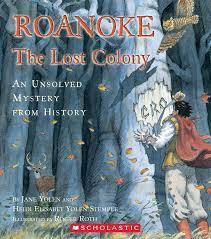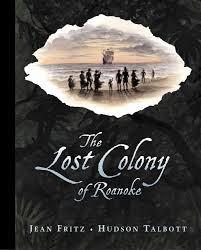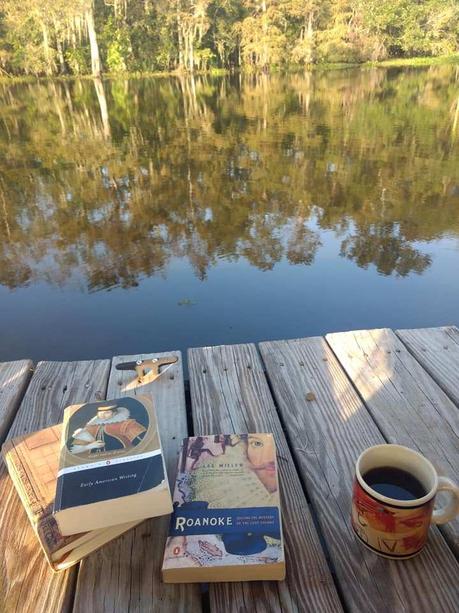The world is full of things we’ll never know and one thing I do know is that the more I learn, the more I realize I don’t know.
As a child, the story of Roanoke was glossed over in history classes. It maybe earned itself a whole paragraph in a textbook… The colonists disappeared, most likely they were either slaughtered or absorbed by Native tribes. End of story. Now let’s talk about Jamestown and Pocahontas.
Wait, what?! That’s it!?

Jane Yolen’s picture book Roanoke addresses all the theories and just how big a mystery it actually is quite nicely, which I appreciate for my kid. At least she’s been given a bigger bit of bait than I had at that age. As a lifetime sucker for anything written by Jean Fritz, we’re also reading The Lost Colony together, it’s longer and one usually tackled by slightly older kids whereas Yolen’s picture book can be read in one sitting.

As far as information and writing style go, I prefer Jean Fritz––every time––and especially this time. Jean Fritz is my go to for all kids and young adult history books. We have a pretty extensive Fritz collection and still aren’t close to owning all the author’s work. I was so pleased to add The Lost Colony to our library, which in addition to beautiful illustrations, included all the most recent theories (as of 2001) and a summarization of Lee Miller’s Roanoke: Solving the Mystery of the Lost Colony.
I read Lee Miller’s book and found it completely enthralling. As a homeschool family, we pick up and take our studies pretty much everywhere, and the week of Roanoke we had the luxury of spending on the Atchafalaya Basin. The only thing that could have been more perfect would have been if we had been in the Virginia and North Carolina swamps and beaches instead of the Louisiana ones––but the ambiance for the unraveling of a sixteenth century crime was perfect.

The book truly had me on the edge of my seat, due largely because of content. The writing style, which annoyed many reviewers on Goodreads, was superfluous at times, but I got the sense that it was the genuine excitement of the author jumping full swing into storytelling mode. I find the premise she suggested not only possible, but plausible based on her presentation of evidence. It’s a great book to read to get a big picture view of both sides of the pond when it comes to early American history. Too many books seem to focus on the colonies or Europe, but rarely truly show what is happening on both sides of the globe at the same time during the era.
Miller brings everything back to Elizabeth I’s Spymaster, so naturally I had to find out if her claims could be substantiated. Up next, my findings in Stephen Budiansky’s Her Majesty’s Sypmaster: Elizabeth I, Sir Francis Walsingham, and the Birth of Modern Espionage.
